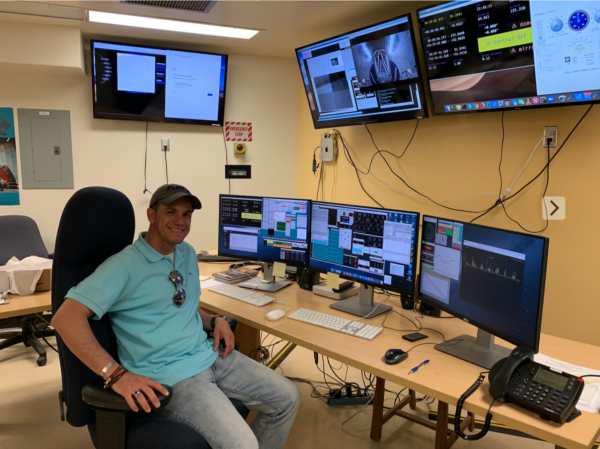 What is your position or role in the DESI project?
What is your position or role in the DESI project?
I am one of the telescope operators at the 4meter/Mayall telescope.
Where were you born?
Originally born in Cali, Colombia. I moved to Florida in the fall of 1998. After high school, I moved to Gainesville, FL to attend the University of Florida. After college, I stayed in Gainesville working as a graduate research assistant in the astronomy department working in different projects including extra-solar planets, extragalactic evolution and AGN. I also took graduate courses (non-degree seeking) in aerospace engineering. I then moved to Arizona in the Summer of 2013.
Where do you live now?
Tucson, Arizona.
What do you do as part of DESI?
As part of DESI, I am a telescope operator at the Mayall. I assist visiting astronomers with their work on DESI. I am primarily responsible for the control of the telescope making sure pointing is correct, the telescope systems are working properly and the telescope is slewed safely across the sky. I am responsible for the overall safety of the telescope and observatory facilities. I also contribute to documentation for telescope operations and safety. I am experienced with technical support for the telescope and its systems. Depending on the night, I might be asked to run tests for the engineer group.
What is the most interesting or exciting thing about your job?
The most exciting thing about my job is the opportunity I get to work with different astronomers, scientists and engineers from different backgrounds and expertise. As a telescope operator at KPNO, we are also asked to operate the 3.5m/WIYN telescope, and as such, we get to work on a variety of science projects during our 6 night shift. One night we might use a spectrograph on clusters, then switch to an imager to follow asteroids and then finally head to the Mayall to work on DESI. It makes our job very fun and interesting. On bad weather nights, we might also get the chance to host visitors from the public night program. It is a great opportunity to show them our work with first hands on experience of our control room and the telescope itself.
Any advice for an aspiring scientist?
Get involved early and try to work on different projects doing a variety of science. You might not know what really drives you until you try it! Perhaps you have always been interested in the solar system, but what if you give your self a chance at working with an infrared instrument to unveil the most massive galaxy clusters in the universe? or do spectroscopy of ultra-low metallicity star-forming galaxies? During this time you can find out where you can best use your skills: you can work in Scientific programming, instrumentation, data analysis, or observing techniques. Last but not least, never stop asking questions!
What do you do for fun?
On the days that I am off duty from the observatory, I work as a substitute teacher at Desert View High School in the Sunnyside Unified School District of Tucson, Arizona. I am also the assistant coach for the boys’ soccer team. As a substitute teacher, I get assigned to all subjects from Math to English and Spanish to Art. I work with 9-12 grades but mostly enjoy working more with the upper classes. Being a substitute teacher (and coach) has been one of the most rewarding experiences of my life. I use this opportunity to be a good role model for the kids and be a strong advocate for science and the work we do at Kitt Peak. It is very inspiring to see the kids get interested in science and astronomy whenever I tell them what I do for a living. In my spare time, I enjoy spending time with my family and I like to play soccer, run and hike the Sabino canyon. I also enjoy dancing.
